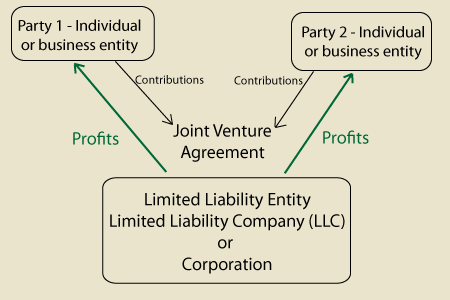Structuring Joint Venture Agreements in California

|
Authored by Bryan Springmeyer Bryan Springmeyer is a California corporate attorney who represents startup companies. The information on this page should not be construed as legal advice. |
Joint ventures are relationshsips between two business entities to collaborate on a particular venture. The collaboration could be motivated by strategic or financial reasons, to pool resources, divide risk, or exploit joint assets. Under California law, joint ventures are nearly identical to general partnerships. No filing with the secretary of state is required for their formation, nor are any written documents necessary. Similarly, the two arrangements, by themselves, are not typically subject to securities laws or franchise tax. These are all attractive aspects of these agreements, but the trade-off is liability.
| The parties involved in a joint venture agreement or a partnership are subject to personal liability for the debts incurred in the venture. Each of them is jointly and severally liable, meaning that each is responsible for the entire amount of the debts until the entire debt is satisfied. If the persons involved in the joint venture agreement are business entities, the assets of those business entities would be subject to satisfy debts of the venture.
Whether the parties to the joint venture are individuals or business entities, a prudent course of action is to create a new limited liability business entity for the purposes of the joint venture. This way, if the venture is unsuccessful, the parties are not liable for the resulting debts, assuming the entity was adequately capitalized and followed the necessary formalities. The available entities, with their respective liability treatment and franchise tax treatment are listed in the chart below. |
 |
| Liability | Franchise Tax | |
| Limited Partnership | This entity would only work if one of the parties to the agreement was simply an investor. The investor, who would be a limited partner, would have limited liability. However, the party acting as the general partner would not. | The LP would have to file with the Sec. of State and would have to pay the $800 min franchise tax at the end of each fiscal year. |
| Corporation | The corporation is a limited liability entity. As long as all corporate formalities are followed, and the company is started with sufficient capital, neither party would incur personal liability. | There is a Secretary of State filing and a minimum franchise tax. However, the franchise tax for the first fiscal year is based off of income, and all subsequent years are subject to the $800 minimum. |
| Limited Liability Company (LLC) | Same as the corporation above. | $800 minimum, which is due after the first quarter of each fiscal year, including the first. |
Many people prefer the LLC, because both parties will receive limited liability, without being subject to the same formalities as the corporation (i.e., electing board members, board meetings with minutes, maintaining corporate records). However, using a corporation makes sense if further investment might occur, as the transfer of ownership is easier with stocks than LLC ownership units.
Related Articles:
Starting a New Business - Choosing an Entity
Negotiating a Venture Capital Transaction
